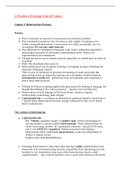2.3 Problem 4: Psychology of the 20th Century
Chapter 5: Behaviourism (Watson)
Watson:
1) Wasn’t interested in concerns of consciousness & mind-body problem
2) Was committed to positivist view of science as only capable of studying overt,
visible, measurable phenomena. Consciousness not visible, measurable, can’t be
investigated. We can only study behavior
3) Was impressed by contemporary biological work: Loeb’s reductionist approach to
psychological questions as answerable in physiological terms. Watson saw
experimental psych as amateurish
4) Thought that psych was too human-centered, argued that we should focus on behavior
in general
5) Didn’t like hereditarian bias in psych
6) Believed that psych was an adjunct to biology, its findings serving to illuminate the
organism’s biological structure
There is need for uniformity in procedure & reporting of results and results that
interest behaviourist are things like learning curves & rapidity of habit formation.
Introspection is totally out – internal processes not important, more important to
look at observable processes.
Problem for Watson is tackling higher-order phenomena like thinking & language, but
thought that thinking is like ‘subvocal speech’ – speech is an overt behaviour
Behaviourism evolved language of Pavlovian theory: stimulus, response,
reinforcement, conditioning, habit strength
Logical positivism = everything can ultimately be explained logically, traced back to
1 specific thing. Behaviourism has been strongly influenced by this, can be linked
back to reductionism
The varieties of behaviourism
Logical positivism:
E.C. Tolman: organisms acquire a ‘cognitive map’ of their surroundings by
moving around it, a process called ‘latent learning’. These internal factors are
called ‘intervening variables’ & ‘hypothetical constructs’. Instead of S-R alone,
now it was S-O-R (O = organism). Tolman concerned w/developing a
behaviourism which could handle purposiveness, avoid over-reductionism of
Watson’s original version
Explains more individual differences
Extending behaviourism to other topics than learning. Lashley adopted behaviourist
framework in his brain functioning research, claimed that brain functioning was only
localized in very broad terms, large tracts of the brain showing what he called
‘equipotentiality’ – they could be utilized to serve a great many functions and assume
, those of the part which had been removed. This was in line w/Watson’s
environmentalism
Skinner vs. Hull
Skinner’s approach was almost atheoretical, purely concerned with empirically
studying the shaping of behaviour by reinforcement, no attention to internal events, no
elaborate theory construction
Hull’s theory was producing a ‘hypothetico-deductive’ theory with postulates,
theorems and quantification. Algebraic system: sOr = ‘momentary behavioural
oscillation’ & sUr = ‘unlearned receptor-effector connection’
Hull’s theory was weak
Skinner’s was better
The Decline of Behaviourism
The return of instincts
Using white rat as basis of behaviourism was problematic; white rat was convenient,
bc it’s a highly adaptive animal, its behaviour is highly environmentally determined
Behaviourists started expanding number of species being used, but found that there
were built-in constraints on the S-R connections they could learn. All species were
prepared/counter-prepared to learn, or not learn, certain kinds of behaviour
But was it behaviourism really declining?
Behavioural approaches to management & self-management (e.g., smoking) were still
being used. Cognitive Behavioural Therapy // it’s effective, not for higher purposes
The Impact of Behaviourism
Promoted image of ‘human being as maze-bound rat’
May have been our mistake for thinking that behaviourism is meant to be a
philosophy of life, bc it’s not
Conclusion
Behaviourism was important for psych as it moved it methodologically into realm of
natural sciences, by insisting that psychologists behave like scientists
Theoretical price was abandonment of concern w/many genuinely profound
philosophical & theoretical questions about psychology’s status & nature,
commitment to reductionism which was unsatisfying for many




